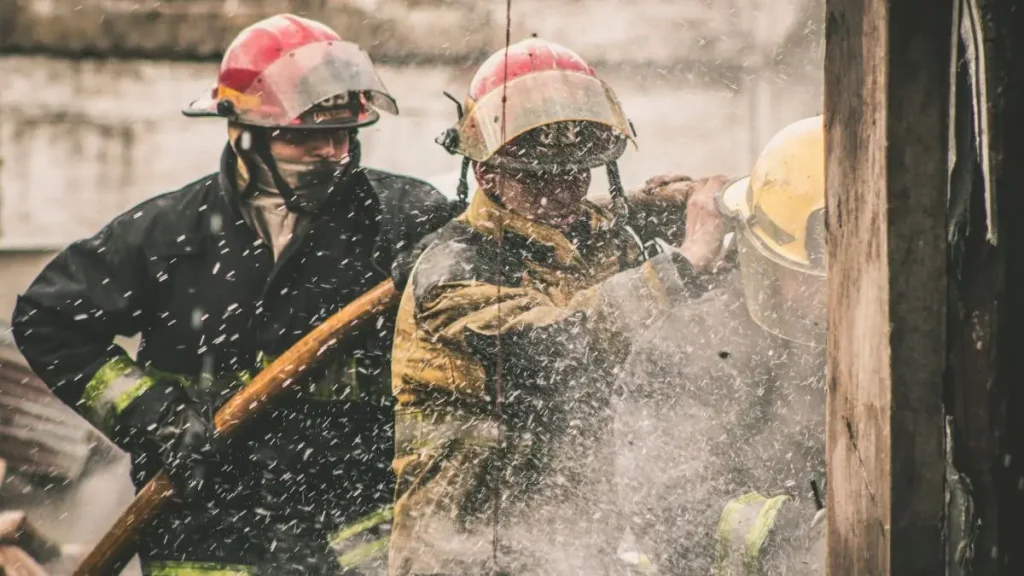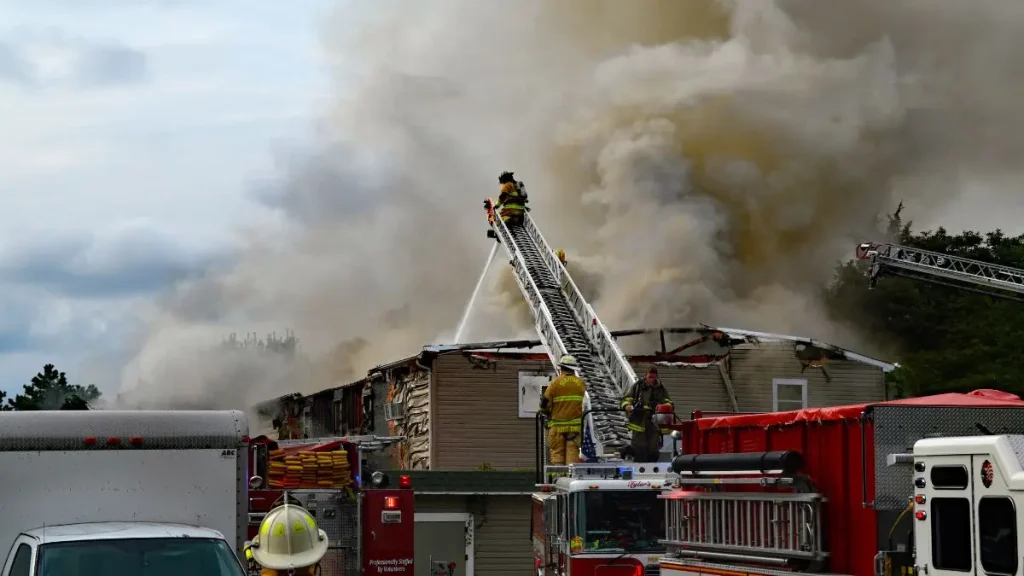Southeast Portland Home Fire Turns Deadly, Officials Say
I woke up to the kind of news that makes you stop and check your own smoke alarms. Early Wednesday morning a single-story home on the 3300 block of Southeast 124th Avenue — near SE Powell Boulevard in Powellhurst-Gilbert — caught fire, and one person died after firefighters pulled them from a high-heat area inside the house.
Portland Fire & Rescue says crews were called around 3:45 a.m.; they found heavy flames and smoke coming from the back of the home and had the blaze under control by about 4:05 a.m. Firefighters faced extreme “floor-to-ceiling” clutter inside, which made searching the house and reaching the occupant much harder.
The victim hasn’t been identified, and their cat is still unaccounted for; investigators are now working to determine the cause.
I’ll walk you through what happened, why clutter matters in a fire, and — most importantly — the practical steps you can take tonight to reduce the same risk in your own home. Before that though: if you live alone or care for someone who does, check your escape routes and that your alarms are working right now.
How the Southeast Portland House Fire Unfolded?

When I checked KGW’s early report, the details hit hard. Around 3:45 a.m., Portland Fire & Rescue crews rushed to the 3300 block of Southeast 124th Avenue, near Powell Boulevard. The back of a small, single-story home was already in flames. Heavy smoke poured out from every side, turning that quiet stretch of the Powellhurst-Gilbert neighborhood into a nightmare scene.
By 4:05 a.m., firefighters had the blaze under control — barely twenty minutes after the first call. But in that short window, a life was already lost. One firefighter found a person trapped inside, in an area where temperatures had spiked dangerously high. They carried them out, but it was too late.
Crews later described the inside as “floor-to-ceiling clutter.” Imagine walking into a maze of stacked boxes, old furniture, and narrow walkways — that’s what these firefighters faced while trying to find someone’s loved one. It’s a detail that turns a tragic event into a lesson about how something as simple as clutter can become deadly fuel when fire strikes.
Just last month, in an East Moline house fire, five residents barely escaped after flames tore through their home before dawn — another case that shows how fast morning fires can turn fatal.
Inside the Investigation
Right now, investigators are digging into what sparked the blaze. No official cause has been released yet, but Portland Fire has confirmed there’s no sign of criminal intent. The home’s wiring and heating setup will likely be part of the inspection.
The victim hasn’t been named publicly. According to officials, they were the only person living in the house. Even their cat — mentioned in multiple local reports — hasn’t been found. That small note, a missing pet, reminds you this isn’t just about property damage. It’s about life suddenly cut short in a space meant to feel safe.
I’ve covered enough of these incidents to know: after every fire, families want answers fast. But a solid investigation takes time. Fire debris has to be sifted carefully; cause and origin experts need to confirm every spark trail. And yet, beyond the forensics, what’s left are the questions we all think quietly — Could this happen to me?
In a Hartford multifamily fire, investigators faced similar challenges tracing the cause — proof that uncovering what happened often takes days, not hours.
What This Fire Reveals About Home Safety?
If you’ve never thought much about clutter as a fire risk, you should. I’ve seen cases where rooms packed with stuff not only fueled the flames but also trapped people inside because doors couldn’t open fully or hallways were blocked. The National Fire Protection Association (NFPA) notes that homes with hoarding or clutter issues lead to longer response times and higher fatality rates.
You don’t have to be a “hoarder” for this to matter. Even ordinary storage overflow — stacks in the hallway, boxes near heaters — can turn seconds into minutes when escaping. The Southeast Portland fire is a painful reminder of that.
So tonight, before bed, take five minutes. Clear the path from your bedroom to the front door. Make sure every smoke alarm works. Those two steps save lives — no exaggeration.
I often share short, real-world fire safety updates and prevention checklists on a WhatsApp channel that covers incidents like this across the country — if you like staying ahead of risks, it’s worth following for quick reminders that actually make a difference.
Why This Story Matters Beyond One Address?

I don’t share this just to replay a tragedy. I share it because these small, early-morning fires happen more often than we realize — and too many end the same way.
Old homes, cluttered rooms, tired wiring — they’re not just “house issues.” They’re survival issues. The fire on Southeast 124th Avenue is a wake-up call for all of us who assume it’ll never be our house, our family, our night.
So here’s my ask: take five minutes today and walk your home like a firefighter would. Could you move quickly if the smoke alarm went off? Is your path clear? Would rescuers even reach you easily?
These aren’t just safety checks — they’re second chances. And after reading what happened in Southeast Portland, I think we all deserve to give ourselves one.
We’ve seen it before — in a West Virginia home fire, a quiet night turned into chaos in minutes — a chilling reminder that early-morning fires are among the deadliest.
What Happens Next?
The Fire Marshal’s office will take weeks to finish its investigation, and that patience matters. Every burned wire, every melted plug, every corner of that room tells part of the story of how the Southeast Portland house fire started.
Once the official cause is confirmed, Portland Fire & Rescue will release updates — and sometimes those findings lead to changes in local fire-safety programs or building-code checks.
What happens next also depends on the community. In many fatal fires, neighbors quietly start GoFundMe pages or memorial drives once the victim’s name becomes public. Local outreach teams often use these incidents to talk about home-safety inspections and smoke-alarm programs.
I hope that happens here, because real change rarely comes from a headline — it comes from neighbors looking out for one another.
If you live nearby, pay attention to the department’s follow-up reports. They’re not just paperwork; they’re lessons written in real lives.
Key Takeaways
This tragedy in Southeast Portland isn’t just another local news brief — it’s a reminder of how fragile the line is between “safe” and “too late.” Here’s what stands out to me after looking through every report and official note:
- Fires move fast — control time here was about 20 minutes, but that’s long enough to change everything.
- Clutter kills — not always directly, but by slowing rescue and fueling smoke.
- Prevention isn’t complex — clear paths, working smoke alarms, and mindful storage make all the difference.
If you take anything from this story, let it be urgency. Don’t wait for an inspection report or another sad headline to remind you. Walk through your home tonight, notice what could trap you, fix one small thing, then share that awareness with someone else.
So, let me ask you — when was the last time you tested your smoke alarms or cleared your escape path?
It takes less than five minutes. And after what happened on Southeast 124th Avenue, those five minutes might be the best investment you make all year.
If you found this story useful, explore more real home safety reports and prevention insights at our website Build Like New. Every story we share comes with a lesson that could save a life.
Disclaimer: Details in this article are based on information available from Portland Fire & Rescue and local news outlets as of publication time. The investigation into the Southeast Portland house fire is still ongoing, and updates may change as officials release new findings. Readers are encouraged to follow verified local sources for the latest information.


